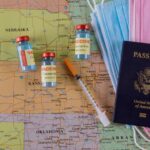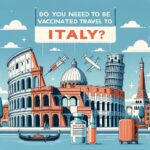With the ongoing global pandemic, many people have been wondering if they can travel to Italy if they are vaccinated. This article will provide an overview of Italy’s current travel restrictions and entry requirements for vaccinated travelers, as well as the specific vaccination requirements, exemptions, and considerations. Additionally, it will offer practical tips and advice for vaccinated travelers planning to visit Italy while also discussing the potential impact of vaccination requirements on the country’s tourism industry.
As countries around the world continue to navigate the challenges posed by the COVID-19 pandemic, travel restrictions remain in place to mitigate the spread of the virus. For those considering a trip to Italy, understanding the specific entry requirements and protocols is essential. With vaccination playing a crucial role in reopening international travel, it is important for travelers to be aware of how their vaccination status may impact their ability to visit Italy.
In this introductory section, we will explore the current travel restrictions in place in Italy and discuss why vaccination has become so important in the context of traveling. Understanding these factors will help prospective travelers make informed decisions and adequately prepare for their trip to Italy.
Overview of Italy’s Travel Restrictions
Italy has implemented specific entry requirements and protocols for travelers, particularly in light of the ongoing COVID-19 pandemic. As of now, Italy is allowing entry to fully vaccinated travelers from certain countries, while also maintaining restrictions for others. Additionally, unvaccinated travelers must adhere to stricter guidelines and requirements upon arrival in Italy.
For vaccinated travelers, a negative COVID-19 test result may still be required before entering Italy. The specific testing requirements can vary depending on the traveler’s country of origin and vaccination status. Furthermore, vaccinated individuals may not be subject to quarantine upon arrival in Italy, but it is essential to stay updated on the latest regulations and guidelines to ensure compliance with any changes.
In addition to testing and quarantine measures, Italy also requires all travelers to complete a self-declaration form before their arrival. This form includes important information about the traveler’s health status and recent travel history. It is crucial for vaccinated travelers to familiarize themselves with these entry requirements and protocols before embarking on their journey to Italy.
| Entry Requirements | Protocols | Testing Requirements |
|---|---|---|
| Fully Vaccinated | Negative test result may be required | Varies based on traveler’s country of origin and vaccination status |
| Unvaccinated | Stricter guidelines and requirements | Negative test result likely required |
Vaccination Requirements
Italy has implemented specific vaccination requirements for travelers in response to the COVID-19 pandemic. These requirements are important to consider for individuals wondering, “Can I travel to Italy if I am vaccinated?” Understanding the specific vaccination requirements and accepted vaccines is crucial for those planning to visit Italy.
Accepted Vaccines
Travelers to Italy must ensure that they have received a COVID-19 vaccine that is authorized by the European Medicines Agency (EMA) or the World Health Organization (WHO). Currently, Italy accepts the Pfizer-BioNTech, Moderna, AstraZeneca, and Johnson & Johnson vaccines for entry into the country. It is important for travelers to verify that their vaccination was completed with one of these approved vaccines.
Necessary Documentation
In addition to receiving an accepted COVID-19 vaccine, travelers to Italy must provide documentation as proof of vaccination. This documentation typically includes a vaccination certificate or card issued by their healthcare provider or government health agency. The certificate should clearly indicate the individual’s full name, date of birth, type of vaccine received, dates of administration, and any additional relevant information.
Additional Considerations
While vaccination is a key requirement for entry into Italy, it is important to note that individuals who have only received one dose of a two-dose vaccine series are not considered fully vaccinated. Travelers who have received a single-dose vaccine or a two-dose series should ensure that they complete the recommended dosage before traveling to Italy.
Additionally, individuals who cannot receive the COVID-19 vaccine due to medical reasons should consult with Italian authorities regarding potential exemptions and alternative entry requirements.
By understanding the specific vaccination requirements and necessary documentation for travel to Italy, vaccinated travelers can better prepare for their trip and comply with entry protocols set by Italian authorities. It is essential for individuals considering travel to Italy to stay informed about any updates or changes in vaccination requirements prior to their trip.
Exemptions and Considerations
Current Exemptions
As of the latest updates, Italy has provided some exemptions for vaccinated travelers, particularly those coming from certain countries with low COVID-19 transmission rates. These exemptions may allow vaccinated individuals to enter Italy without undergoing quarantine or testing requirements. It is important to stay updated on the specific countries and regions that are eligible for these exemptions, as the list may change based on the evolving pandemic situation.
Considerations for Those Who May Not Be Fully Vaccinated
For individuals who may not be fully vaccinated or unable to receive the vaccine due to medical reasons, there are considerations to keep in mind when planning travel to Italy. In such cases, it is essential to review the alternative entry requirements and protocols set forth by the Italian government. This may include additional testing measures and quarantine procedures to ensure the safety of both the traveler and the local population.
Potential Considerations for Unable Individuals
It’s essential for those unable to receive the vaccine due to medical reasons or age restrictions to carefully consider their travel plans and consult healthcare professionals for guidance on potential risks and necessary precautions. Can i travel to italy if i am vaccinated?
Each case will be unique and require personalized attention to address any concerns regarding health and safety while traveling. Additionally, individuals in this category should stay informed about any updates or changes in vaccination requirements and entry protocols that could affect their ability to travel to Italy.
Travel Tips for Vaccinated Travelers
As Italy gradually opens its borders to international travelers, vaccinated individuals may be wondering about the specific guidelines and recommendations for visiting the country. If you are fully vaccinated, you can travel to Italy, but it is essential to familiarize yourself with the entry requirements and necessary documentation before your trip. To ensure a smooth and safe travel experience, here are some practical tips and advice for vaccinated travelers planning to visit Italy.
First and foremost, it is crucial to stay updated on Italy’s current travel restrictions and entry requirements for vaccinated travelers. Before making any travel arrangements, be sure to check the latest guidelines issued by Italian authorities and verify that you meet all the necessary criteria for entry. This may include providing proof of vaccination, negative COVID-19 test results, or completing a passenger locator form.
Additionally, it is advisable to have a clear understanding of the specific vaccination requirements for travelers to Italy. Make sure that your vaccine is accepted in Italy and that you have the appropriate documentation to demonstrate your vaccination status upon arrival. Keep in mind that requirements may vary depending on the type of vaccine received and when it was administered, so double-checking these details can help prevent any potential issues during the entry process.
During your trip to Italy, prioritize safety measures such as practicing good hygiene, wearing masks in crowded or enclosed spaces, and adhering to any local regulations or guidelines. Stay informed about the latest developments in Italy’s response to COVID-19, including any updates on public health measures or restrictions that may affect your travel plans.
By remaining vigilant and responsible throughout your visit, you can contribute to a safer experience for yourself and those around you while enjoying everything that Italy has to offer.
Impact on Tourism
Italy’s tourism industry has been significantly impacted by the COVID-19 pandemic, with travel restrictions and vaccination requirements playing a crucial role in shaping the experiences of travelers. As the country works to mitigate the spread of the virus while reopening its borders to international visitors, understanding the potential impact of vaccination requirements on tourism is essential for both tourists and local businesses.
The implementation of vaccination requirements as a prerequisite for travel to Italy can have both positive and negative effects on the tourism industry. On one hand, it serves as a crucial measure to protect public health and safety, reassuring both tourists and locals that necessary precautions are being taken to prevent the spread of COVID-19. This can ultimately boost confidence in travel and contribute to a more sustainable recovery for Italy’s tourism sector.
However, it is also important to consider the potential challenges that vaccination requirements may pose for travelers. While vaccinated individuals can generally navigate entry processes more easily, there are still logistical aspects to consider such as ensuring that proper documentation is readily available and compliant with Italy’s specific requirements. Additionally, some travelers may face obstacles in accessing certain vaccines or obtaining proof of vaccination, raising equity concerns within the travel industry.
To adapt to these changes and ensure a positive experience for vaccinated travelers, here are some practical tips:
- Research Italy’s specific vaccination requirements and ensure that you have received an accepted vaccine
- Keep all relevant documentation readily accessible, including digital copies if possible
- Stay informed about any updates or changes to Italy’s travel restrictions through official sources
Understanding these potential impacts and preparing accordingly can help vaccinated travelers navigate their visits to Italy more effectively while also supporting the recovery and resilience of the country’s vital tourism industry.
Current Updates and Resources
As of the current update, Italy has implemented specific travel restrictions and entry requirements for travelers, including vaccination requirements. Here are some important updates on Italy’s travel restrictions and vaccination requirements to keep in mind if you are considering a trip to Italy.
Some of the key updates and resources include:
- Entry Requirements: Travelers to Italy must meet certain entry requirements, including providing proof of vaccination, a negative COVID-19 test result, or undergoing quarantine upon arrival. It is essential to stay informed about any changes to these requirements before planning your trip.
- Accepted Vaccines: Italy currently accepts various vaccines for entry, including Pfizer-BioNTech, Moderna, Johnson & Johnson, AstraZeneca, and any other vaccine that has received approval from the European Medicines Agency (EMA) or World Health Organization (WHO). Ensuring that you have received an accepted vaccine is crucial for complying with Italy’s vaccination requirements.
- Documentation: Travelers must be prepared to provide documentation of their vaccination status, which may include a digital vaccine certificate or official proof of vaccination. Being proactive in obtaining and organizing these documents can help streamline the entry process upon arrival in Italy.
For the latest updates on Italy’s travel restrictions and vaccination requirements, it is recommended to consult official sources such as the Italian Ministry of Health or the Italian embassy or consulate in your country. Additionally, staying informed through reputable travel advisories and international health organizations can provide valuable insights into any changes or developments that may impact your travel plans.
By keeping abreast of current updates and resources, vaccinated travelers can navigate Italy’s entry process with confidence and ensure a smooth and enjoyable trip.
Conclusion
In conclusion, the question “Can I travel to Italy if I am vaccinated?” is a pertinent one for many individuals eager to visit this beloved destination. As discussed in this article, Italy has implemented specific entry requirements and protocols for travelers, including vaccination requirements. While the ability to travel to Italy if vaccinated offers hope for a return to normalcy, it is essential for travelers to stay informed about the latest updates and resources regarding travel restrictions.
The vaccination requirements for travelers to Italy play a crucial role in facilitating safe and responsible travel. By detailing the specific vaccination requirements – including accepted vaccines and necessary documentation – this article aims to empower individuals with the knowledge needed to navigate the entry process successfully. Moreover, exemptions for vaccinated travelers and considerations for those who may not be fully vaccinated or unable to receive the vaccine are important aspects to consider when planning a trip to Italy.
As the tourism industry in Italy continues to adapt to changing circumstances, the impact of vaccination requirements on travel experiences can be significant. Not only does being vaccinated provide peace of mind for travelers, but it also contributes to efforts aimed at protecting public health. Adhering to safety protocols, staying updated on current travel restrictions, and making responsible choices while traveling can help mitigate risks and support a sustainable return to enjoyable experiences in Italy.
Frequently Asked Questions
Are There Covid Restrictions to Enter Italy?
Yes, there are Covid restrictions to enter Italy. As of now, travelers from the United States and other high-risk countries must present a negative Covid-19 test taken within 72 hours before arrival in Italy.
What Do Americans Need to Enter Italy?
Americans need to enter Italy include a negative Covid-19 test result, completed Passenger Locator Form, and compliance with any quarantine or health regulations upon arrival in Italy.
What Is the Current Travel Advisory for Italy?
The current travel advisory for Italy is that it is open to tourists from the United States, but with certain restrictions in place due to the ongoing Covid-19 pandemic. Travelers are advised to check for the latest updates before planning their trip.

I’m a passionate traveler, writer, and Italophile. My fascination with Italy’s history, art, and culture has led me on countless adventures across the Italian landscape. Through “I Live Italy,” I share my love for this extraordinary country and aims to inspire others to explore its boundless beauty.




